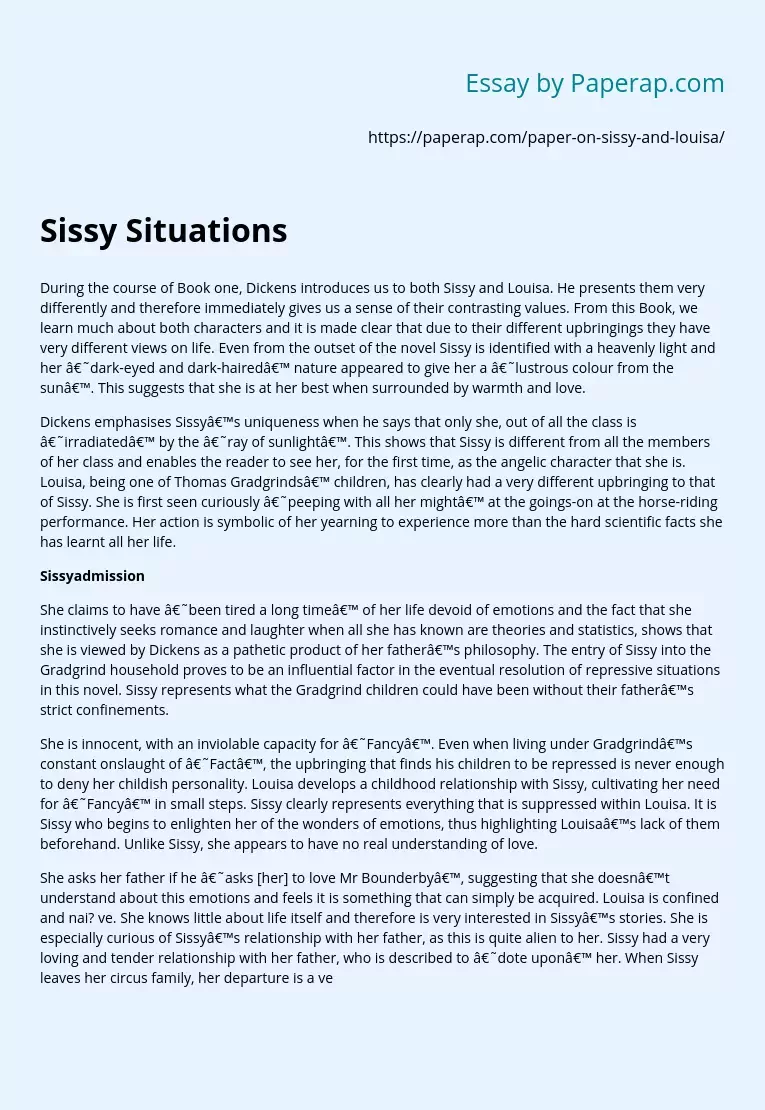Situations with Sissy and Louisa in Hard Times
During the course of Book one, Dickens introduces us to both Sissy and Louisa. He presents them very differently and therefore immediately gives us a sense of their contrasting values. From this Book, we learn much about both characters and it is made clear that due to their different upbringings they have very different views on life. Even from the outset of the novel Sissy is identified with a heavenly light and her ‘dark-eyed and dark-haired’ nature appeared to give her a ‘lustrous colour from the sun’.
This suggests that she is at her best when surrounded by warmth and love.
Dickens emphasises Sissy’s uniqueness when he says that only she, out of all the class is ‘irradiated’ by the ‘ray of sunlight’. This shows that Sissy is different from all the members of her class and enables the reader to see her, for the first time, as the angelic character that she is. Louisa, being one of Thomas Gradgrinds’ children, has clearly had a very different upbringing to that of Sissy.
She is first seen curiously ‘peeping with all her might’ at the goings-on at the horse-riding performance. Her action is symbolic of her yearning to experience more than the hard scientific facts she has learnt all her life.
She claims to have ‘been tired a long time’ of her life devoid of emotions and the fact that she instinctively seeks romance and laughter when all she has known are theories and statistics, shows that she is viewed by Dickens as a pathetic product of her father’s philosophy.
The entry of Sissy into the Gradgrind household proves to be an influential factor in the eventual resolution of repressive situations in this novel. Sissy represents what the Gradgrind children could have been without their father’s strict confinements.
She is innocent, with an inviolable capacity for ‘Fancy’. Even when living under Gradgrind’s constant onslaught of ‘Fact’, the upbringing that finds his children to be repressed is never enough to deny her childish personality. Louisa develops a childhood relationship with Sissy, cultivating her need for ‘Fancy’ in small steps. Sissy clearly represents everything that is suppressed within Louisa. It is Sissy who begins to enlighten her of the wonders of emotions, thus highlighting Louisa’s lack of them beforehand. Unlike Sissy, she appears to have no real understanding of love.
She asks her father if he ‘asks [her] to love Mr Bounderby’, suggesting that she doesn’t understand about this emotions and feels it is something that can simply be acquired. Louisa is confined and nai? ve. She knows little about life itself and therefore is very interested in Sissy’s stories. She is especially curious of Sissy’s relationship with her father, as this is quite alien to her. Sissy had a very loving and tender relationship with her father, who is described to ‘dote upon’ her. When Sissy leaves her circus family, her departure is a very emotional one and she is clearly very attached to her friends.
She feels that to abandon her circus origins will ‘break [her] heart’, a concept that Louisa is not familiar with. Sissy comes from a world of music, nature and drama. She has been brought up very differently from Louisa and consequently has been taught to appreciate different things. Whereas Louisa sees important in maths and science, Sissy values her father and his love for her. Sissy’s animated character and her enthusiasm to learn contrasts greatly with Louisa’s emotionless vocabulary and jaded, apathetic state of mind.
Their differences in upbringing and in life in general, allow them to form a relationship where their contrasting views are shown evermore present. Throughout the first book, we understand that Louisa is clearly fascinated by Sissy different background. When Sissy enters the Gradgrind household she is warned never to speak of her past life, and from constant encouragement by Louisa to disobey her father in this sense, we can understand that she has the potential to appreciate her emotions.
Situations with Sissy and Louisa in Hard Times. (2019, Dec 05). Retrieved from https://paperap.com/paper-on-sissy-and-louisa/

